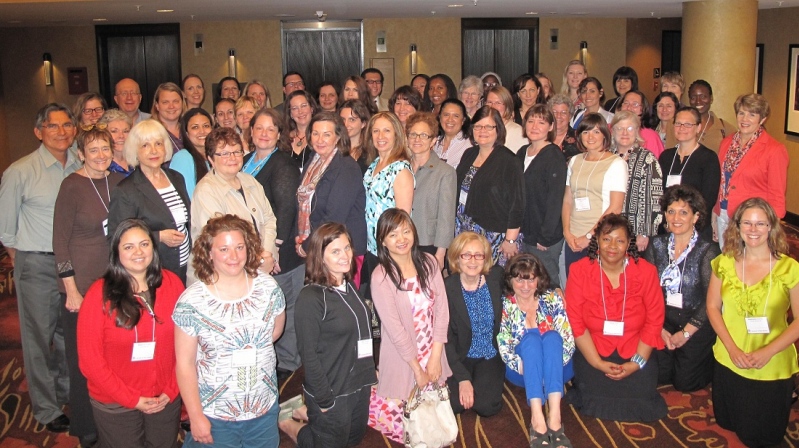|
| |
ITBE Goes to Washington 2013 TESOL Advocacy & Policy SummitYurimi Grigsby, ITBE Advocacy ChairThe program of the Summit was essentially divided into two parts: policy and advocacy. The goal was to not only learn more about federal policy issues impacting ESL and ELLs, but to provide a hands-on learning experience on elements of advocacy. Before the summit, TESOL International Association provided guidance and experience as each of us contacted our Congressional representatives and set up our individual meetings. Preparation for the summit also included familiarizing ourselves with the issues in advance to help make the Congressional meetings more effective. It was in this way that the voices of teachers and teacher educators were so powerful; that we could share with our representatives the challenges and impact that certain bills would have on our students and our profession. Each of us could identify examples from our own state to illustrate our perspectives and illuminate their offices with relevant experiences to provide context and open insights into our world as educators. The first part of the Summit focused on policy issues. Following a welcome reception and overview of policy issues the evening before, the program started the morning of June 17 with briefings from experts on key issues and legislation. Adam Fernandez, Legislative Associate with the Mexican American Legal Defense and Education Fund (MALDEF) and co-chair of the Hispanic Education Coalition (HEC) started the morning with a discussion of some of the issues in immigration reform and reauthorization of the Elementary and Secondary Education Act (ESEA) impacting ELLs. This was followed by a panel featuring Joanne Urrutia from the Office of English Language Acquisition (OELA) and Supreet Anand of the Title III Group at the U.S. Department of Education who co-presented on the activities of their offices. To close out the morning, Debra Suarez from the Office of Vocational and Adult Education (OVAE) at the US Department of Education provided an update on new initiatives for adult ESL and adult education. Following these briefings, the Summit shifted its focus to advocacy with a series of activities to help participants learn more about the advocacy process, and prepare for our meetings with members of Congress. We had a chance to meet in small groups to discuss various issues we faced locally, and to share tips and ideas in meeting with legislators. There was an overall sense of camaraderie, that we were all united by a purpose that was bigger than we were. On June 18, all of the participants went to Capitol Hill to have meetings with members of Congress and staff. I, along with Dr. Timothy Collins from National Louis University, met with staff from the offices of Senator Richard Durbin, Senator Mark Kirk, Representative Danny K. Davis, and Representative Jan Schakowsky. We were able to discuss the budget issues and the importance of restoring funding for education to pre-sequestration levels, continuing to fund Teacher Quality Programs and national professional development and RTTT teacher quality grants. Dr. Collins and I brought to their attention the importance of restoring funding for the Workforce Investment Act, a federal law providing training for people who are out of work, and need training to change career paths, and the desire to see the population of adult English language learners be included in the state grant formula for adult education as well as to see more funding for EL Civics. Two other topics we addressed were the need for comprehensive immigration reform in which personal stories of our students and friends were shared, and the increasing amount of empirical evidence showing the negative effects on students produced from today’s climate of over-testing. I learned a great deal by taking part in this event. For starters, the process of being an advocate was re-understood. Merriam-Webster defines advocacy as “the act or process of supporting a cause or proposal.” I learned that it is my First Amendment right to “petition the government for a redress of grievances.” The process of contacting Congressional representatives and speaking to them about issues important to me was demystified. It may seem obvious to those reading this, but I learned how very human our lawmakers are. They read our letters. Congressional members want to hear what we have to say on matters that pertain to us, issues that greatly affect us, the research-proven programs and outcomes that guide us, and the successes in our students that inspire us. It is their job to hear more, learn more, and do more. They cannot do this without our help. Nor should we let them. Teachers must use their voice and speak out. Yes, it takes time, attention, and energy. Yet, as T.F. Hodge said, “The sky is not my limit…I am.”  Above: Summit attendees meeting with staffers. Contact Yurimi at advocacy@itbe.org with any questions or comments. | |
| The ITBE Link - Summer 2013 |